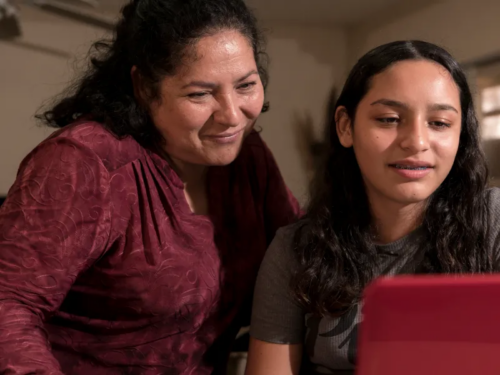
Table of Contents
What Is Middle Child Syndrome?

Written By: Ashley Laderer

Clinically Reviewed By: Dr. Don Gasparini
December 19, 2023
8 min.
“Middle child syndrome” may not be a formal mental health diagnosis, but it can sum up a middle child’s experiences pretty well. Read on to learn more about the unique traits of middle children.
Learn more about our Clinical Review Process
Table of Contents
If you’re a middle child, you may have heard the phrase “middle child syndrome,” but what exactly is it? Well, first things first, it isn’t a real “syndrome” or mental health condition. Rather, it’s a term used to describe a developmental phenomenon that some middle children may experience. Some, but not all, middle children relate to the term, which helps them feel seen and validated. In this blog, we’ll dive into the phenomenon of middle child syndrome, birth order theory, how middle child syndrome manifests itself in adults, and more.
What is middle child syndrome?
“Middle child syndrome is often used to describe the developmental impact of being born in the middle of one or more children,” says Charlie Health Clinical Director Sam Adams, LPC, NCC.
According to Adams, this developmental impact can result in certain personality traits or quirks in middle children. The stereotype is that a middle child might feel overlooked or neglected compared to their older and younger siblings. They might be looked at as a misfit in the family or feel like they are.
However, not every middle child will exhibit the same characteristics. It’s important to consider parenting style, family dynamics, and individual personalities. All of this will play a big role in how a middle child develops and whether or not they develop middle child syndrome.
Join the Charlie Health Library
Get mental health updates, research, insights, and resources directly to your inbox.
You can unsubscribe anytime.
What causes middle child syndrome?
“Those who study and investigate birth order hypothesize that children born in the middle take on different personality traits as a result of being stuck in the middle, therefore receiving less developmental support from their primary caregivers,” Adams explains.
Charlie Health Outreach Manager Paxton Murphy, M.Ed., NCAC, adds that parents may be more hands-off with middle children. “There may be less involvement, reduced one-on-one interaction, and increased sibling overshadowing, which lessens the parental attachment,” she says. “Middle children generally do not feel like their favorite child. Since more attention is paid to their siblings, the child tends to feel unseen by both parents.”
For example, middle children may receive less attention from their caregivers due to having a trailblazing older sibling and a younger sibling who has growing developmental needs, says Adams.
What is birth order theory, and how is it tied to middle child syndrome?
Middle child syndrome is loosely tied to birth order theory, which proposes that the order in which you were born can impact your psyche and personality. The theory was introduced in the early 1900s by Alfred Adler, an Austrian psychotherapist who was a pioneer in psychoanalysis. According to the theory, each birth order position—oldest child, middle child, and youngest child—has a developmental impact on children, leading to specific personality traits.
Many studies have been conducted over the years on birth order theory. Results have been mixed, but some findings have suggested that middle children report the lowest level of happiness compared to oldest and youngest children. However, other research has shown that the oldest children may be at the highest risk for psychiatric conditions. Additionally, a review of 200 birth order studies found that the personality traits most commonly associated with middle children were being sociable and feeling like they don’t belong.
However, there’s so much more to personality than birth order. The review of 200 studies concluded that birth order was only one variable in overall personality development, including gender, family norms, family values, culture, and ethnic and community values. “All of these factors highlight the larger constellation of one’s personality,” Adams says. So, while birth order theory could certainly play a role in peoples’ personalities, this is only one piece of the puzzle.

What are common signs of middle child syndrome?
As previously mentioned, every middle sibling (and every individual in general) is different. Everyone has a unique set of characteristics and personality traits. Also, of course, these traits aren’t inherently bad. “These same experiences could lead to tremendous positive personality characteristics, allowing the person to thrive in various parts of their lives and functioning,” Adams says. Some signs of middle child syndrome may include:
Feeling overlooked by family
Middle-born children may feel overlooked by their parents due to the developmental needs of their siblings and the family’s changing resources, Adams says. They may feel like their parents or parents pay more attention to their younger or older siblings.
Trying to keep the peace
The middle child can end up figuratively and literally in the middle. “They find themselves in the middle of various situations, molding them into the family peacemaker,” says Murphy.
Independence
As a result of feeling overlooked by family members, middle children may be self-reliant and struggle to ask for help and support from others, Adams says. This could include struggling to ask a parent for help.
Feeling like they don’t belong
Due to their place in the family, they might have a sense that they don’t belong, Adams says. This could mean in the family, amongst their peers, or both.
Feelings of inadequacy
“In regards to their relationship development, middle children tend to feel more inadequate and not equal to their siblings or peers,” says Murphy. This can cause middle children’s self-esteem to take a hit.

Competitive
“Middle children tend to naturally be more competitive,” Murphy says. “Research supports that the middle child tends to fight their siblings for attention.”
Relating more to people of other ages
Middle children may struggle to make meaningful connections with same-age peers, Adams says. Instead, they might find themselves getting along easier with people who are younger or older than them.
Sociable
Middle children may be more social. However, Adams says they might have low social batteries and feel like they always have to be “on.”
How can middle child syndrome affect adults?
“Since the middle child is impacted during childhood, they tend to carry these traits into adulthood. While there are positive characteristics, there are also negative traits, such as having an all-or-nothing mindset,” Murphy says.
Furthermore, being a middle child can affect your attachment style in relationships in adulthood. For example, Murphy says many adult middle children end up being extremely independent, showing fearful-avoidant attachment within relationships. “This attachment style makes it difficult for a person to trust others and feel emotionally safe within relationships,” she said.
Or, an adult middle child’s attachment style could go the opposite way. “On the opposing side, a middle child can exhibit co-dependence within a relationship mirroring childhood behaviors –– such as giving all of their love and attention to an individual who does not reciprocate,” Murphy says.
Due to all of their childhood experiences, Murphy says some common traits a middle child might carry into adulthood include:
- Being a peacemaker or mediator
- Having strong relationships with people outside of the family
- Easygoing
- Independent
- Self-motivated
- Successful in their careers
6 tips for how to cope with middle child syndrome
There are certainly both pros and cons to being a middle child. However, if middle child syndrome has got you down and you feel like you’re struggling, here are a few tips to try:
1. Journal
“Practice journaling to work with your thoughts about yourself, " says Adams. “It can be helpful to write, talk, act, or draw out how you are feeling. Validate your own emotional experiences, as they are uniquely your own.” There’s no right or wrong way to journal. Just put your pen to paper and start writing. Once the words get flowing, you’ll be able to get deeper in touch with your emotions.
2. Set boundaries
Middle children are used to being stuck in the middle, playing the role of the mediator or peacekeeper. However, it’s important to remember that your needs are also very important.
Murphy suggests that you set personal boundaries and stand by them. Think about what boundaries would make you feel safe and comfortable, and communicate this with your loved ones. Yes, you can even set boundaries with your parents!
3. Take care of yourself
“Remember to take time to care for yourself and meet your own needs. Sometimes that is saying no to plans when you feel already overwhelmed or taking cooking dinner off of your to-do list by ordering take-out,” Adams says. Other self-care ideas include:
- Exercising
- Getting enough high-quality sleep
- Eating a nutrient-rich diet
- Practicing positive self-talk
- Creating art
- Playing an instrument
- Practicing mindfulness or meditation
- Reaching out to your support network
4. Celebrate your wins
You might have grown up feeling like your accomplishments were overshadowed by your younger sibling or older sibling –– but your accomplishments matter and should absolutely be celebrated. “Practice taking time out of your day to highlight and celebrate your accomplishments, small and large,” Adams suggests.
5. Find support outside of your family
“Find interests and community outside of your family if you find your family to be a triggering or unsupportive environment,” Adams says. “This can be within community centers, pottery classes, or yoga studios. Plus –– don’t forget about the power of the virtual world when you are seeking community.”
6. Seek professional help
You may want to consider seeing a therapist to work through your family history if it’s impacting your current self negatively, Murphy says. This could be the case if you find yourself having unhealthy relationships or low self-esteem, for example. These are struggles that a mental health professional can help you with by diving deep into your past.
How Charlie Health can help
If you’re struggling with the mental health effects of middle syndrome, Charlie Health is here to help. Charlie Health’s virtual Intensive Outpatient Program (IOP) provides more than once-weekly mental health treatment for young people dealing with complex mental health conditions. Our expert clinicians incorporate evidence-based therapies into individual counseling, family therapy, and group sessions. With treatment, managing your mental health is possible. Fill out the form below or give us a call to start healing today.





